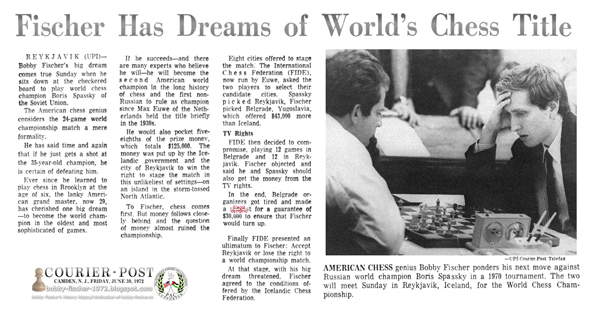Courier-Post Camden, New Jersey Friday, June 30, 1972 - Page 12
Fischer Has Dreams of World's Chess Title By Ian Westergren
Reykjavik (UPI)—Bobby Fischer's big dream comes true Sunday when he sits down at the checkered board to play world chess champion Boris Spassky of the Soviet Union.
The American chess genius considers the 24-game world championship match a mere formality.
He has said time and again that if he just gets a shot at the 35-year-old champion, he is certain of defeating him.
Ever since he learned to play chess in Brooklyn at the age of six, the lanky American grand master, now 29, has cherished one big dream —to become the world champion in the oldest and most sophisticated of games.
If he succeeds—and there are many experts who believe he will—he will become the second American world champion in the long history of chess and the first non-Russian to rule as champion since Max Euwe of the Netherlands held the title briefly in the 1930s.
He would also pocket five-eighths of the prize money, which totals $125,000. The money was put up by the Icelandic government and the city of Reykjavik to win the right to stage the match in this unlikeliest of settings—on an island in the storm-tossed North Atlantic.
To Fischer, chess comes first. But money follows closely behind and the question of money almost ruined the championship.
Eight cities offered to stage the match: The International Chess Federation (FIDE), now run by Euwe, asked the two players to select their candidate cities. Spassky picked Reykjavik, Fischer picked Belgrade, Yugoslavia, which offered $43,000 more than Iceland.
TV Rights
FIDE then decided to compromise, playing 12 games in Belgrade and 12 in Reykjavik. Fischer objected and said he and Spassky should also get the money from the TV rights.
In the end, Belgrade organizers got tired and made a request ([an illegal demand which the USCF refused to pay]) for a guarantee of $30,000 to ensure that Fischer would turn up.
Finally FIDE presented an ultimatum to Fischer: Accept Reykjavik or lose the right to a world championship match.
At that stage, with his big dream threatened, Fischer agreed to the conditions offered by the Icelandic Chess Federation. The Icelanders, although there are only 200,000 of them, are chess-mad and the organizers say they are assured of sellout crowds of 5,000 in the Laugardals-Hoellin indoor sports arena.
Leaves Games
The crowd is another potential cause of trouble with the American challenger, who has been known to leave games because the noise of the crowd irritated him.
Fischer and Spassky, at a chess board made of white and green Icelandic stones and seated in specially constructed chairs, will be placed on the stage in the hall.
The organizers, aware of Fischer's hot temper, first suggested that a glass wall be erected between the players and the crowd. But Fischer rejected the proposal.
Other things which have come under fire from Fischer are the lighting and the ventilation in the hall and the choice of German grand master Lothar Schmid as umpire.
24 Games
However, Icelandic chess officials are satisfied that Fischer will accept the arrangements. They were not even worried when Fischer abruptly decided to change his arrival date. “We are satisfied he will be here in time,” they said.
The games will be played Sundays, Tuesdays and Thursdays with adjourned games being finished on Mondays, Wednesdays and Fridays.
The match is scheduled for 24 games, but as is customary in world championship play, the remaining games will be canceled when one of the two has reached 12.5 points or more. The players get one point for a win and half a point for a draw.
To retain his title, Spassky needs only 12 points—a draw. To win the title, Fischer will have to score 12.5 points or more.
Under the FIDE rules, Fischer and Spassky must make 40 moves in two and a half hours. If the game is still undecided then, it will be adjourned and finished later with both required to make 16 moves an hour. A player running out of time forfeits the game.
While Fischer has predicted an easy victory, Spassky has refused to speculate about the match.
Spassky, who won the title in 1969 from fellow countryman Tigran Petrosian, is the favorite of Danish grand master Bent Larsen.
Larsen, who was defeated by Fischer in the elimination for the Reykjavik match and served as Fischer's adviser at one time, feels Spassky's experience from two previous world championship games and his better nerves will be decisive.
Aggressive Player
“Fischer is a genius, an aggressive player who fights as long as there is a pawn left on the board,” Larsen said. “But if I have to pick a favorite, I would pick Spassky because of his routine and better nerve control.”
Spassky has paid tribute to Fischer, whom he described as “a remarkable chess player. Without him the world of chess would be very dull.”
While Fischer goes on attack to win every game and is thrown off balance by a draw, Spassky has proved in previous matches that he can come back from a series of drawn games to score decisive wins.
They have met five times before, with Spassky winning three games and drawing two.
But the Russian, who leads a comfortable life on his earnings as a professional chess player, agrees that Fischer has got more fire.
Spassky told Western correspondents he would rather be at home in Moscow with his family and friends “sharing some wine and playing chess for fun” than competing for the world title in Reykjavik.
To Fischer chess is almost everything, and Spassky says he does not understand his obsession. “I would like to teach Bobby that there are other things than chess in life.”


























